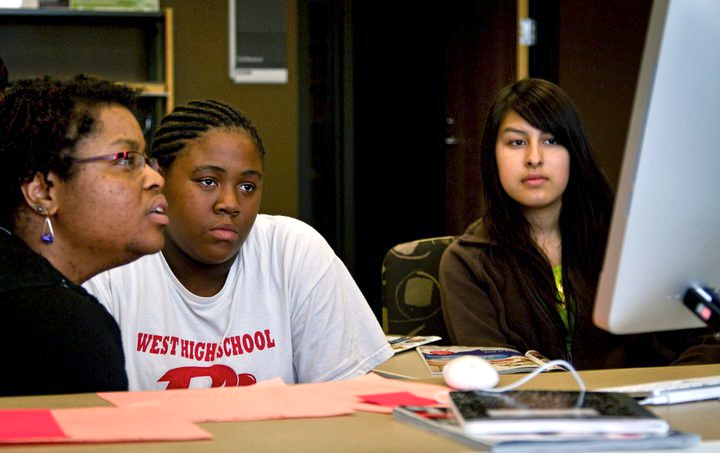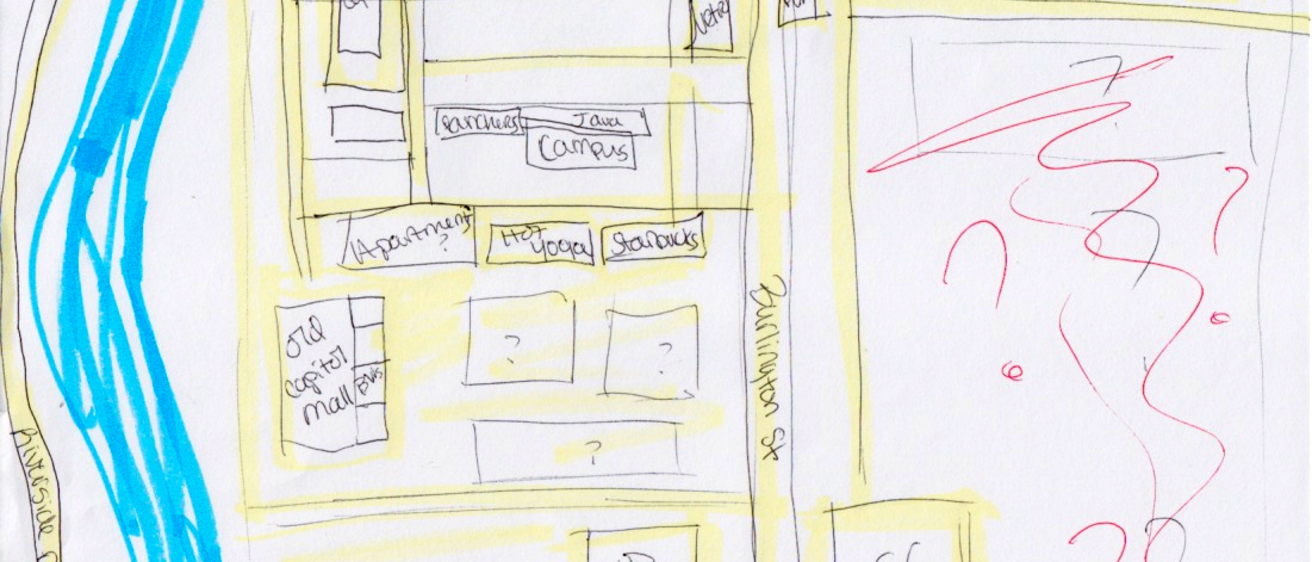Raquel Baker (English, CLAS) and Ted Gutsche (Journalism and Mass Communication, CLAS) met via the Obermann Graduate Institute. Today, the two PhD candidates are using their mutual interests in civic engagement and social justice to create a General Education Literature course that takes students into the local community to find "concealed stories" and share them with a broader audience.
One of the assignments in Raquel Baker’s “Interpretation of Literature” class this spring was to draw “mental maps” of Iowa City, sketches and drawings of what people know—or think they know—about a particular geography.
"Mental maps tell us about how we interact with the spaces and places around us, not just geographically but ideologically,” said Ted Gutsche, a graduate student in Journalism and Mass Communication (CLAS) with whom Baker has frequently collaborated and who led the map making exercise. “The students’ maps were especially telling about how university undergraduates are not integrated with life off-campus.”
Most of the students’ maps represent downtown and campus, but then just fall away, the rest of Iowa City either unfamiliar or uninteresting to them. Those blank spaces include Iowa City’s Southeast Side, a cluster of racially and economically diverse neighborhoods totally unknown to many UI students. Uncovering the hidden or little known stories of that community is one of the goals of Baker’s class.

In order to help students feel safe in exploring sometime explosive narratives around race, gender, and socio-economics, Baker, a PhD candidate in English (CLAS) and a former Obermann Graduate Institute Fellow, decided to focus on stories about race and society that appeared in popular culture, literature, and the news from the 1990s. "It’s easier for students to talk about events that are slightly removed from them," says Baker (pictured far left with students), who is a storyteller herself. An example of a story that the class studied was the Susan Smith case, in which Smith drowned her two sons and blamed it on an African American man. Although her initial story was easily accepted by the news media and the public, an investigation quickly revealed that Smith acted alone. In her English class, students were asked to think about how society has – or hasn’t – changed in 30 years. “How does this story replay itself in today's news?” Baker asked the class.
After focusing the first half of the semester on readings in various genres that identified "concealed" stories – ones often silenced or marginalized by dominant culture - students have spent the second part looking for local examples of such stories through interviews, writing, and filmmaking.
After focusing the first half of the semester on readings in various genres that identified "concealed" stories – ones often silenced or marginalized by dominant culture - students have spent the second part looking for local examples of such stories through interviews, writing, and filmmaking. Baker turned to Gutsche, who was in her Graduate Institute cohort, to help make connections to Iowa City’s southeast side. As a journalist, Gutsche has worked to tell stories of new arrivals to this neighborhood through the community storytelling website CrossingBorders.us [link no longer active] that he maintains with Baker and Daniel Kinney (Art Education, College of Education), also an Institute Fellow.
The students’ work will culminate with two public events. On May 1, Gutsche has organized a free showing of the play Mayberry. Written and produced by Sean Lewis and Working Group Theatre, the play was commissioned by Hancher and immediately sold out. It is based on more than 50 interviews that Lewis did with local Iowa Citians regarding the social and cultural effects that have emerged from a recent influx of urban blacks to Iowa. Although Baker and Gutsche were thrilled that the play was seemingly so successful even before being publicly produced (performances were sold out within a matter of days), they were also aware that the very people about whom much of the play is written were not going to have a chance to see it, given the price of tickets and the logistics of getting to Riverside Theatre -- a place that is likely off most of their "mental maps."
Baker’s class will attend the play, and the next night students will share their work in an evening of multimedia storytelling at the Iowa City Public Library. The stories shared will include both those of insiders and outsiders, and will include commentary on how the southeast side has been presented in local media and the local imaginations of Iowa Citians. It is a night that will offer some new “mental maps” for anyone choosing to participate.
Details:
To attend the May 1 showing of Mayberry at Southeast Junior High School, email Valerie kemp (valerie.kemp@iowa.gov) at the Neighborhood Centers of Johnson County. The May 2nd event, “Return to Mayberry” begins at 5 pm at the Iowa City Public Library. Both events are free and open to the public.
Photo by Dana Davidson
